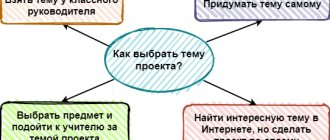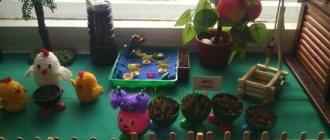Academician D.S. Likhachev once wrote that love for one’s native land, one’s country begins with love for family. And today we must restore our ancient values of caring for family and home. The family influences the child and introduces him to society. We, adults, must help children understand the importance of family, cultivate love and respect for its members, and instill a sense of attachment to home. Unfortunately, in many modern families too little attention is paid to raising children.
The interaction of parents and teachers in the upbringing of preschool children is the mutual activity of responsible adults. It is obvious that the old forms of contact with parents are gradually becoming obsolete. Modern parents, first of all, demand respect for themselves; they are literate, informed, but at the same time very busy. Therefore, they do not want any unnecessary information. Parents' employment is the main problem in the interaction between kindergarten and family. Thus, there is a need to find new approaches to organizing work on the interaction of a preschool educational institution and the families of pupils.
In the practice of modern educational organizations, only traditional forms of work to interact with families are often used, such as: consultations, exhibitions, parent meetings, and, most rarely, conferences, open days, which are held irregularly, and the topic does not always coincide with the content. Parents do not actively participate in such events. Innovative approaches to interaction with the families of pupils are needed, since the use of various forms of work with the parents of pupils helps parents become active participants in the educational process, from “spectators” and “observers” to become active assistants to the teacher.
In order for parents to become interested in the life of the kindergarten and become active participants in the educational process, it is advisable to use one of the unique and effective forms of interaction between the preschool educational institution and the family - project activities. This unique tool not only ensures co-creativity between children and adults, but also ensures cooperation and mutual assistance between teachers and parents. It is a means of integrating preschool educational institutions and families.
The project method is a pedagogical technology, the core of which is the independent activity of children - research, cognitive, productive, during which the child learns about the world around him and embodies new knowledge into real products. The essence of the “project method” in education is such an organization of the educational process in which students acquire knowledge and skills, experience in creative activity, an emotional and value-based attitude to reality in the process of planning and performing gradually more complex practical tasks of projects that have not only cognitive, but also pragmatic value. “Everything I learn, I know, why I need it and where, and how I can apply this knowledge” - this is the main thesis of the modern understanding of the project method, which attracts many educational systems seeking to find a reasonable balance between academic knowledge and pragmatic skills.
The project method is based on the idea of focusing the cognitive activity of preschoolers on the result that is achieved in the process of joint work between the teacher and children on a specific practical problem (topic).
In kindergarten, projects can only be for children and adults. Children, parents, teachers, and preschool specialists take part in such projects. This form is interesting because the joint collection and production of attributes, games, competitions, and presentations reveal the creative potential of children and attract parents to participate.
During the implementation of the project, interaction and creative collaboration occur between parents and children. The atmosphere of fun and games allows you to throw off the shackles of self-control and show your best side. By getting to know their loved ones better, children and parents become closer to each other, which naturally affects the results of their activities.
The foundations of project activities were laid at the beginning of the twentieth century in the pedagogical works of D. Dewey, W.H. Kilpatrick, E. Collings and others. At the same time, domestic innovative teachers S. T. Shatskiy, V. N. Shulgin, M. V. Krupenina, V. V. Ignatiev and others. The authors studied the conditions and methods of introducing and applying project activities in the practice of working with preschool children. In 2000, the active use of project activities began in domestic preschool educational organizations. The teachers believed that project activities could ensure intensive development of creative initiative and independence in children’s learning and would establish a connection between theory and practice.
Veraksa N. E. identifies three main types of project activities: creative, research and normative, each of them has its own characteristics, structure and characteristic stages of implementation. In practice, preschool educational institutions often plan and organize research and creative projects.
Project activities are aimed not only at developing the child’s personality, but also at developing his creative and cognitive abilities, the ability to plan and navigate the information space, work in a team, and carry out the process of learning the necessary information, which should be supported by the real result of the work. N. E. Veraksa said: “project activity has a pronounced coloring and ultimately becomes one of the few socially significant actions available to a preschooler.”
Another feature of this method is that it is targeted, both in the process of interaction and in the final result. Project activity can be represented as a way of organizing the learning process, based on the interaction of the teacher, student and his parents, in step-by-step practically significant activities. The child gains knowledge and skills in the process of careful planning and implementation of gradually more complex practical exercises (projects) and achieves his goal together with the teacher and parents.
In the process of project activities, various tasks are solved: educational, creative, psychological, educational, since they can have different topics and content. Children's knowledge about the world around them expands. In addition, children’s general abilities – cognitive, communicative and regular – develop. A variety of play activities also develops, children’s friendly relationships are formed and strengthened, they become more attentive to each other, and begin to be guided not only by their own opinions, but also by established norms. Thus, the child acquires the qualities of a socially competent person.
Child-parent relationships develop and improve through the joint implementation of a plan. Parents develop an analytical view of the practice of raising and educating children. The position of parents and educators will become more flexible. Children become interesting to parents as partners in joint activities. Now they are not spectators and observers, but active participants in various events. Fathers and mothers feel more competent in raising children. This involves carrying out research and creative projects. Involving parents in joint project activities gives them the opportunity to gain new experience in modeling their own parental behavior, enrich their teaching experience, and discover unknown sides of their own child’s personality.
Project activities also have a huge impact on the teacher. Design forces the teacher to constantly be in the space of possibilities, which changes the worldview and excludes the use of standard actions, requiring personal and creative growth. In this situation, the teacher becomes an attractive communication partner. The teacher designs, plans a system of influences on the child, and predicts the result. The interest of parents in achieving their goals serves as a real help to the teacher. Interaction and cooperation of parenting adults has a positive effect on the all-round development of the child.
With the help of project activities, you can reach a new level of interaction with the family of pupils, change the relationship in the “children - parents - teacher” system. Parents will begin to see teachers as their assistants in education and training, and the kindergarten will become a partner for them. Thanks to this, an atmosphere of mutual respect and understanding of each other is created.
Thus, project activity is an optimal, innovative and promising method. The introduction of project activities into the practice of preschool educational institutions will significantly increase the independence and activity of children, develop their creative and analytical thinking, the ability to find interesting information about a subject or phenomenon and use the acquired knowledge in reproducing new projects. Based on a personality-oriented approach to teaching and upbringing, project activities should ultimately contribute to the personal development of the child.
Adults, in turn, need to help the child discover a problem or provoke its emergence, awaken interest in it and lure children into a joint project. Child-parent pedagogical projects will contribute to the establishment of partnerships with the child’s family and will help in solving pressing problems in the upbringing and education of children in the community of parents and teachers. The attitude of parents will change, both towards the teacher and towards the preschool educational organization as a whole, which in turn will ensure high-quality results of teaching activities.



